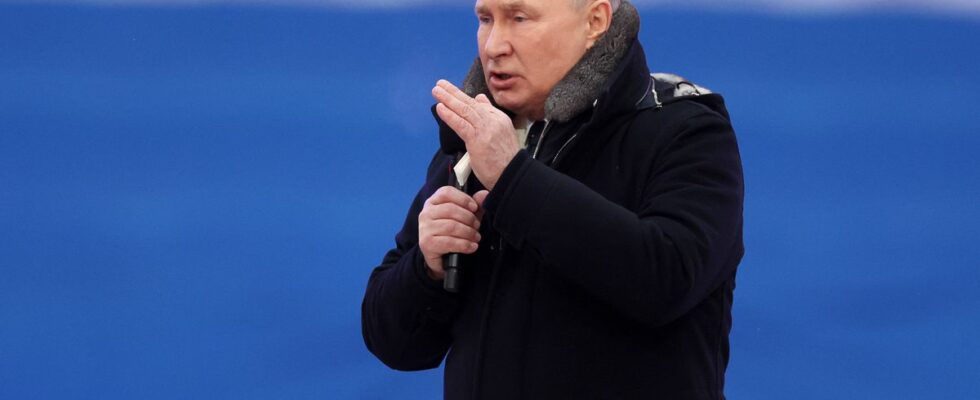A long speech, great hostility towards the West, and a decision. “I am obliged to announce that Russia is suspending its participation in the New Start treaty”, launched Russian President Vladimir Putin, during an address to the nation almost a year after the start of the war. in Ukraine. Immediately, condemnations rained down in NATO, between “serious error”, “rash” decision and regrets.
But what does this nuclear disarmament treaty say? Why is Vladimir Putin only temporarily out of it? Should this be seen as a greater threat of the use of nuclear weapons in Ukraine? 20 minutes takes stock with two experts.
What is the New Start treaty?
“It’s a treatise from the good old days, when Barack Obama wanted to overhaul Washington’s relations with Moscow,” says Philippe Migault, researcher at Iris and co-founder of the Brenus Institute. Signed in 2010 between the two main nuclear powers, this treaty provides “to reduce by 30% the number of usable nuclear warheads”, with a limit of 1550, on board “800 missiles or bombers”. This leaves “largely enough to destroy the Earth several times”, underlines the researcher. One of the central points of the treaty is that Russia can visit and control American installations, and vice versa.
The idea, for the American president, is then to “give a signal” by showing that “the nuclear powers are well on the way to disarmament” to relaunch the dynamic of non-proliferation, explains Isabelle Facon, senior researcher at the Foundation for Strategic Research. The Russian side is then open to negotiating a new treaty because “it gives visibility to the nuclear arsenal of the other power”, but also because “these bilateral negotiations with the United States on this subject are a elements that support the idea that Russia is a great power”.
Originally, the treaty expired in 2021. But, in a context of already very degraded relations, New Start was extended until 2026 at the beginning of 2021 then “Joe Biden and Vladimir Poutine met in Geneva” in June 2021 and reiterated on this occasion their desire to maintain dialogue on this subject. A small miracle.
Why does Russia want to suspend the treaty?
If Russia announced the “suspension” of its participation in the treaty, the Russian Ministry of Foreign Affairs quickly specified that it would continue to respect the limitation of its nuclear arsenal. But according to Moscow, “the United States wants to make Russia suffer a strategic defeat, which according to the Russians considerably changes the environment for the implementation of the treaty”, details Isabelle Facon. From the Kremlin’s point of view, the delivery of “increasingly heavy” weapons to Ukraine contravenes this point. “Strategic bases, with bombers, have already been bombed, like that of Engels along the Volga”, illustrates Philippe Migault. And as, according to him, “NATO already grants all the help of its intelligence services to Ukraine, Russia is not going to make it easier for it by accepting American visits to its bases”.
The gender confusion between NATO and the United States is also pointed out by Moscow, after “a NATO press release of February 3 which denounces that Russia no longer accepts inspections”, notes Isabelle Facon . However, the treaty is bilateral, and “Moscow has been asking for some time to consider integrating the nuclear potential of the three nuclear powers of the alliance” into the discussions on a new treaty. Thus, Vladimir Putin can use his usual rhetoric of “reversal of responsibility, by affirming “it is not us who changed the conditions” of the treaty”, she deciphers.
Does this decision increase the risk that Russia will use nuclear weapons?
For the two experts interviewed by 20 Minutes, the level of threat does not change with this announcement. “It’s a sign of distrust, but the risk of not getting worse”, suggests Philippe Migault, who evokes a “symbolic field”. “The New Start treaty concerns strategic weapons, whereas in Ukraine there is more fear of the possible use of non-strategic weapons”, points out Isabelle Facon.
According to her, the objective is above all to “stimulate those, on the Western side, who are pushing to go quickly to the negotiating table” to avoid escalation. All in a context where Russia “occupies important territories in Ukraine” but no longer manages to advance. Especially since by decreeing a suspension rather than a total withdrawal, the Kremlin “leaves the door open to a return to the treaty” if “the conditions are right”, in other words if Washington stops supporting the EU militarily. Ukraine.

